
Kód: 14262613
Development, Growth, Environment & Social Equity
Autor Alexander Cotte Poveda, Astrid Geovana Muoz Ortiz, Gustavo Correa Assmus
Developing countries need to design projects to increase the growth and wellness of its human population, which involves the inclusion of topics associated directly with the sustainable development of these countries and their par ... celý popis
- Jazyk:
 Angličtina
Angličtina - Vazba: Pevná
- Počet stran: 182
Nakladatelství: Nova Science Publishers Inc, 2016
- Více informací o knize

6755 Kč
Dostupnost:
50 % šance Máme informaci, že by titul mohl být dostupný. Na základě vaší objednávky se ho pokusíme do 6 týdnů zajistit.
Máme informaci, že by titul mohl být dostupný. Na základě vaší objednávky se ho pokusíme do 6 týdnů zajistit.Prohledáme celý svět
Mohlo by se vám také líbit
-

How to Restore Triumph Tr2, 3, 3a, 4 & 4a
1290 Kč -

Intracranial Pressure And Its Effect On Vision In Space And On Earth: Vision Impairment In Space
3590 Kč -

From Surviving to Thriving
428 Kč -

Alerta, malvades a classe!
263 Kč -

La presencia del alma : cómo transformar nuestra vida a través del conocimiento del alma
191 Kč -

El segle mes nou del món
606 Kč
Dárkový poukaz: Radost zaručena
- Darujte poukaz v libovolné hodnotě a my se postaráme o zbytek.
- Poukaz se vztahuje na celou naši nabídku.
- Elektronický poukaz vytisknete z e-mailu a můžete ihned darovat.
- Platnost poukazu je 12 měsíců od data vystavení.
Informovat o naskladnění knihy
Zadejte do formuláře e-mailovou adresu a jakmile knihu naskladníme, zašleme vám o tom zprávu. Pohlídáme vše za vás.
Více informací o knize Development, Growth, Environment & Social Equity
Nákupem získáte 676 bodů
 Anotace knihy
Anotace knihy
Developing countries need to design projects to increase the growth and wellness of its human population, which involves the inclusion of topics associated directly with the sustainable development of these countries and their particular social problems. This book examines the interrelations between development, growth, the environment and inequality, especially in developing countries and taking into account qualitative and quantitative approaches. Increasing welfare of the population is important to the increase of human development through the improvement of developmental and environmental conditions, generating sustainable development where it is key to seek changes in public policies, economic, technological and social factors. This book aims to analyse different contexts from micro to macro level relationships between development, growth, inequality, environment and human development, and evaluate what the actual conditions in emerging economies are and how developing new strategies could improve the well-being of developing countries. The book is organised as follows: Saiz-Alvarez and Gamez identify the main components to propose an entrepreneurship model that includes distance, education, and information and communication technologies (ICTs) as alternatives to generate wealth and development in developing countries. In Chapter Two, Cutolo etal. describes an approach to current situations of water vulnerability in watersheds of metropolitan regions in tropical countries of South America, and the importance to improve the strategies to promote environmental health in these regions. In Chapter Three, Hashim shows a comparison from a historical point of view between two crops, one of them native to South America (quinoa) and the other from Africa (pearl millet). The comparison leads to the questions of whether or not reflexions consider pearl millet as an alternative to food security in African countries and as an incentive for women farmers. In Chapter Four, Palmer and Correa applied three groundwater indicators: a groundwater extraction indicator, a groundwater extraction for public supply per capita indicator and a groundwater vulnerability indicator to describe the different characteristics of the environment and propose this analysis as a tool to make decisions in environmental management within the Cove Basin at the Island of San Andrs (Colombia). Correa in Chapter Five analyses and assesses the impact that poverty and access to water have on labor productivity of the economically active population in Colombia. In Chapter Six, Daronco and Wartchow clarify how the Brazilian policies about water resources have been based on the laws developed at the time of discovery in 1500. Additionally, it regards the culminating active level in the National Water Resources System (NWRS) today. Finally, Castellanos conducts a search and reflection of bioethical dilemmas in veterinary medicine, identifying sources of stress and coping strategies in Chapter Seven.
 Parametry knihy
Parametry knihy
Zařazení knihy Knihy v angličtině Economics, finance, business & management Economics Economic theory & philosophy
6755 Kč
- Plný název: Development, Growth, Environment & Social Equity
- Autor: Alexander Cotte Poveda, Astrid Geovana Muoz Ortiz, Gustavo Correa Assmus
- Jazyk:
 Angličtina
Angličtina - Vazba: Pevná
- Počet stran: 182
- EAN: 9781634847803
- ISBN: 1634847806
- ID: 14262613
- Nakladatelství: Nova Science Publishers Inc
- Hmotnost: 506 g
- Rozměry: 186 × 259 × 15 mm
- Datum vydání: 01. April 2016
Oblíbené z jiného soudku
-

Wealth of Nations
136 Kč -

Wealth of Nations
310 Kč -

Worldly Philosophers
283 Kč -

Basic Economics
840 Kč -

Human Action (4-Volume Set)
914 Kč -

Inquiry into the Nature and Causes of the Wealth of Nations
261 Kč -

Seventeen Contradictions and the End of Capitalism
333 Kč -

Capitalism: A Very Short Introduction
233 Kč -

Principles of Economics
543 Kč -

Mathematics for Economists
1107 Kč -

Bourgeois Virtues - Ethics for an Age of Commerce
520 Kč -

Why Women Have Better Sex Under Socialism
288 Kč -
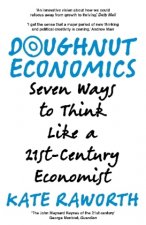
Doughnut Economics
318 Kč -

Book of Satoshi
492 Kč -

Essential Keynes
333 Kč -

New Economics for Industry, Government, Education
964 Kč -

Naked Economics
381 Kč -

Inquiry into the Nature and Causes of the Wealth of Nations
643 Kč -

General Theory of Employment, Interest and Money
397 Kč -

Origin Of Wealth
283 Kč -

Pure Theory of Capital
329 Kč -

Keynes
283 Kč -

OPEC and the Price of Petroleum
1542 Kč -

General Theory of Employment, Interest and Money
529 Kč -

Contra Keynes & Cambridge
380 Kč -

Bourgeois Virtues
1042 Kč -

Economics Book
615 Kč -

Book of Satoshi
745 Kč -
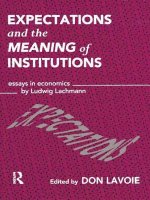
Expectations and the Meaning of Institutions
1953 Kč -

Reflections on Ethics, Freedom, Welfare Economics, Policy, and the Legacy of Austrian Economics
510 Kč -

Essence of Entrepreneurship and the Nature and Significance of Market Process
491 Kč -

Cultural Considerations within Austrian Economics
623 Kč -

Legalized Crime of Banking
544 Kč -

Fortunes of Liberalism
361 Kč -

Epistemological Problems of Economics
308 Kč -

Keynesian Episode
322 Kč -

Four
220 Kč -

Keynes Hayek
415 Kč -
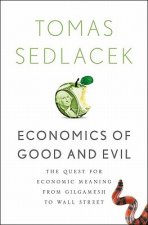
Economics of Good and Evil
635 Kč -

Happiness
283 Kč -

Wealth of Nations
305 Kč -

Constitution of Liberty
921 Kč -
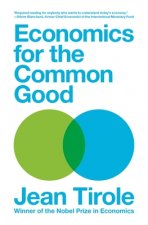
Economics for the Common Good
443 Kč -

Wealth of Nations
611 Kč -

Mathematics for Economics and Finance
1389 Kč -
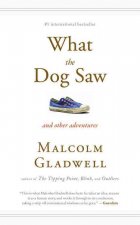
What the Dog Saw
249 Kč -

Technological Revolutions and Financial Capital
1033 Kč -

Kicking Away the Ladder
579 Kč -

Oxford Handbook of Law and Economics
1433 Kč
Osobní odběr Praha, Brno a 12903 dalších
Copyright ©2008-24 nejlevnejsi-knihy.cz Všechna práva vyhrazenaSoukromíCookies


 Vrácení do měsíce
Vrácení do měsíce 571 999 099 (8-15.30h)
571 999 099 (8-15.30h)